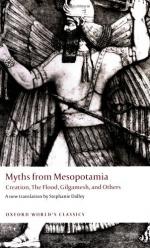|
This section contains 473 words (approx. 2 pages at 400 words per page) |

|
Myths from Mesopotamia: Creation, the Flood, Gilgamesh, and Others Summary & Study Guide Description
Myths from Mesopotamia: Creation, the Flood, Gilgamesh, and Others Summary & Study Guide includes comprehensive information and analysis to help you understand the book. This study guide contains the following sections:
This detailed literature summary also contains Topics for Discussion and a Free Quiz on Myths from Mesopotamia: Creation, the Flood, Gilgamesh, and Others by Stephanie Dalley.
Myths From Mesopotamia: Creation, The Flood, Gilgamesh, and Others tells the tales of ten different myths from ancient Mesopotamia, including the Epic of Gilgamesh, Atrahasis, the Epic of Creation, and the Theogony of Dunnu. Believed to stem from oral tales, these stories have been translated from the original Akkadian stone tablets, showing clearly that these tales of heroism, evil, creation, and the rise and fall of gods spanned not only time, but great distances as well.
The book includes introductions to each story that help the reader to determine the time frame of the tale as well as introduce the main characters and plot line within each tale. First, the story of Atrahasis shows the creation of man, and the survival of man following the angry Flood sent by the gods. The Epic of Gilgamesh, one of the finest literary works of all time, tells the story of a hero's journey through rivalry, friendship, heroism, anguish, hope, carelessness, and finally acceptance of death, and a forward look for the future. Gilgamesh's quest for fame leads to the death of a friend, while his quest for immortality leads only to anguish. In the end, however, he survives, and is able to succeed as king. The story of the Decent of Ishtar shows the power of the gods and the rivalry among sisters, while the myth of Nergal and Ereshkigal show many of the same characters only in a much more humanistic light. In addition, Nergal and Ereshkigal's tale is one of the few passionate love stories found within the myths, and the variations of versions presented in the book show clearly that the tale was widespread in Mesopotamia.
The story of Adapa, who was tricked by the gods into refusing immortality, show the cruelty the gods sometimes showed to mankind. On the other hand, the tale of Etana shows the gods could also show care, concern, and even compassion for mankind, as Shamash leads Etana to the birthing plant. The tale of Anzu tells of the evils the gods did to one another and the disastrous results. There are two tales of creation in the text, those of the Epic of Creation and the Theogony of Dunnu. Drastically different in their presentation of the beginning of the world, the Epic of Creation follows Marduk, Tiamat, and Ea through their battle for survival, while the Theogony of Dunnu shows genocide, patricide, matricide, incest, and pure evil. Finally, the tale of Erra and Ishum show the use of powerful weapons against mankind and the powers of the gods to stop them.
While these stories show a common bond with the Old Testament, the Iliad, Odyssey, Hesiod, and Arabian Nights, they are distinct in their use of Mesopotamian language and surroundings and show that such tales, regardless of origin, are timeless in nature.
Read more from the Study Guide
|
This section contains 473 words (approx. 2 pages at 400 words per page) |

|



